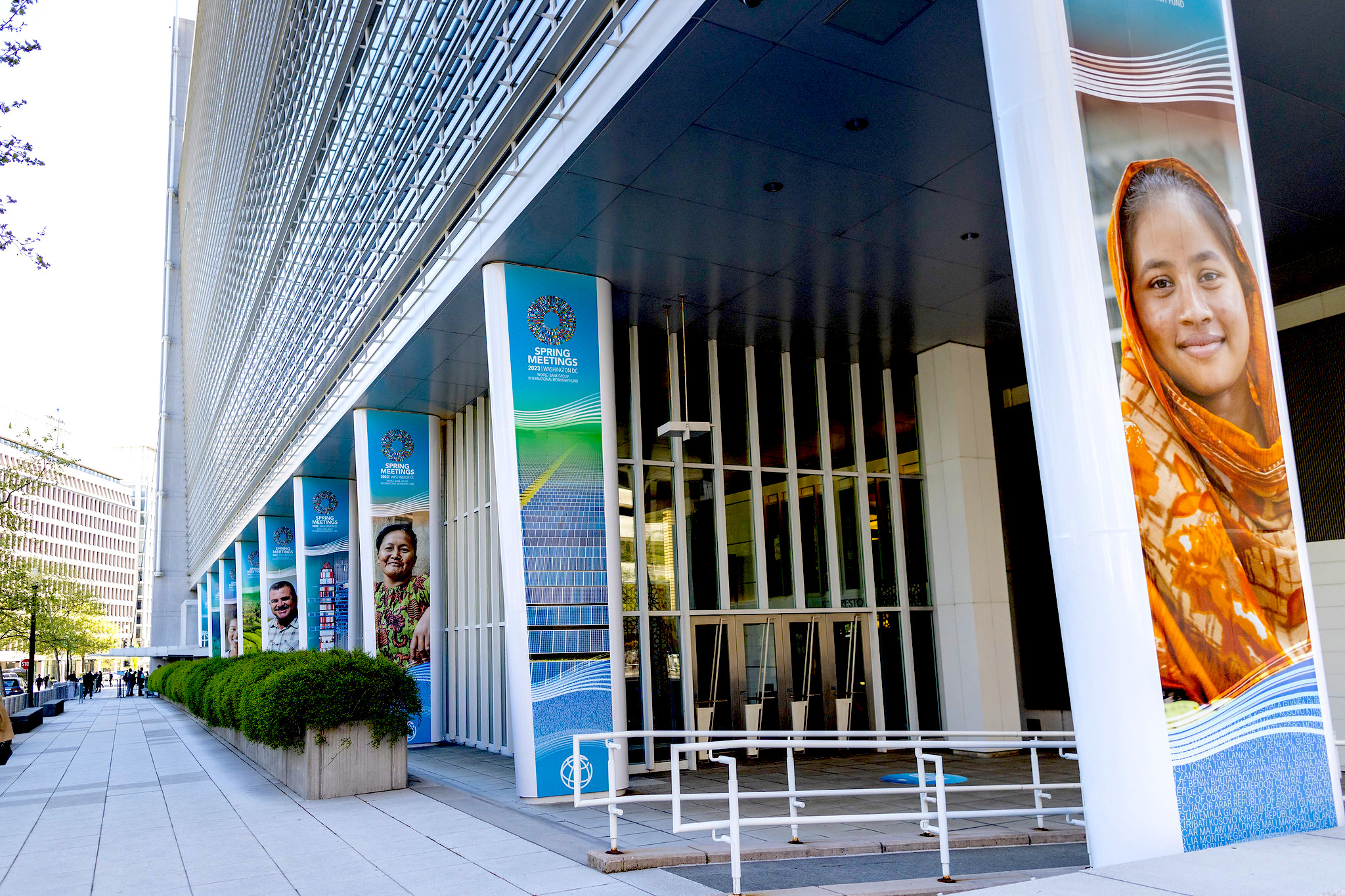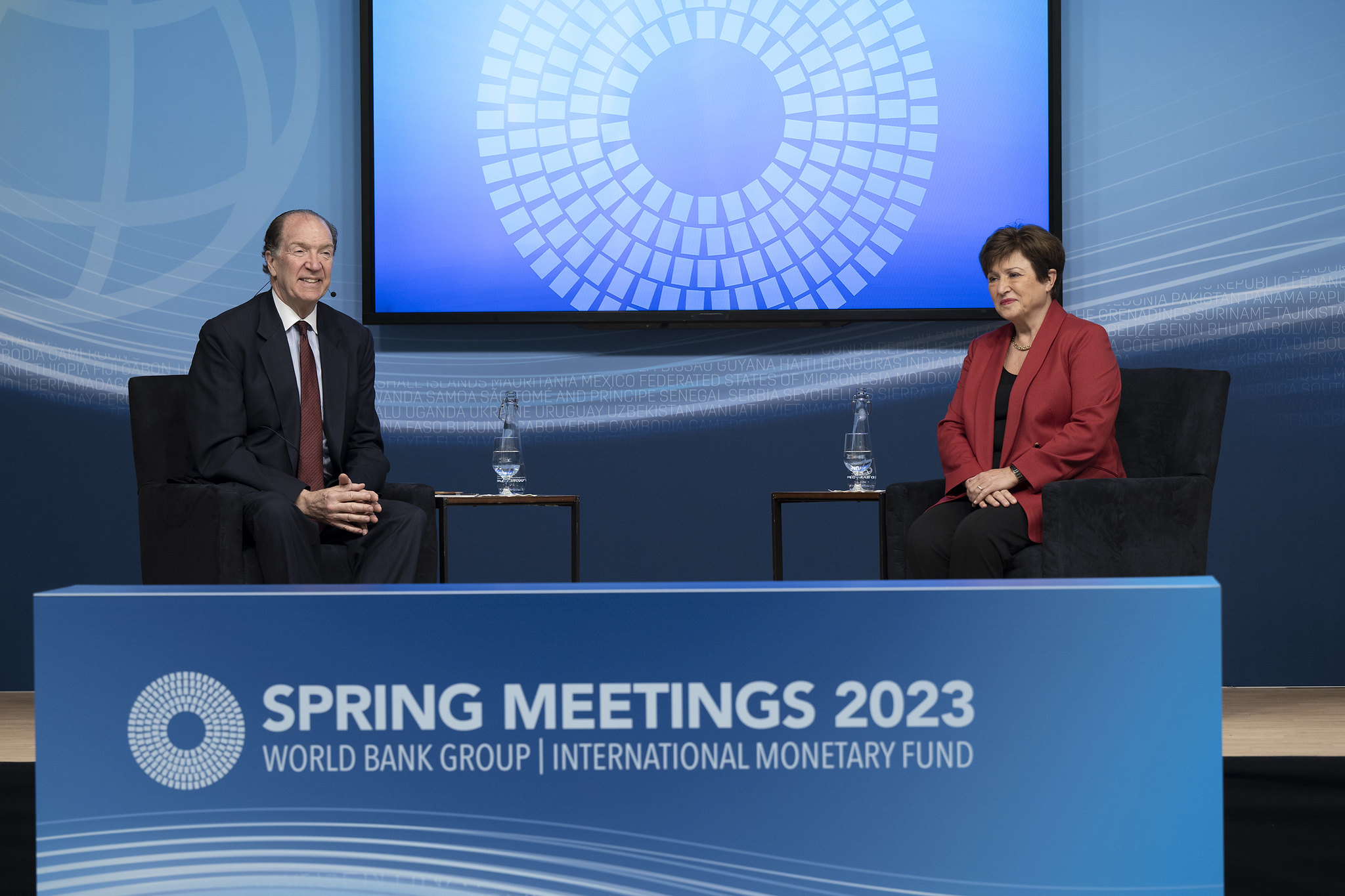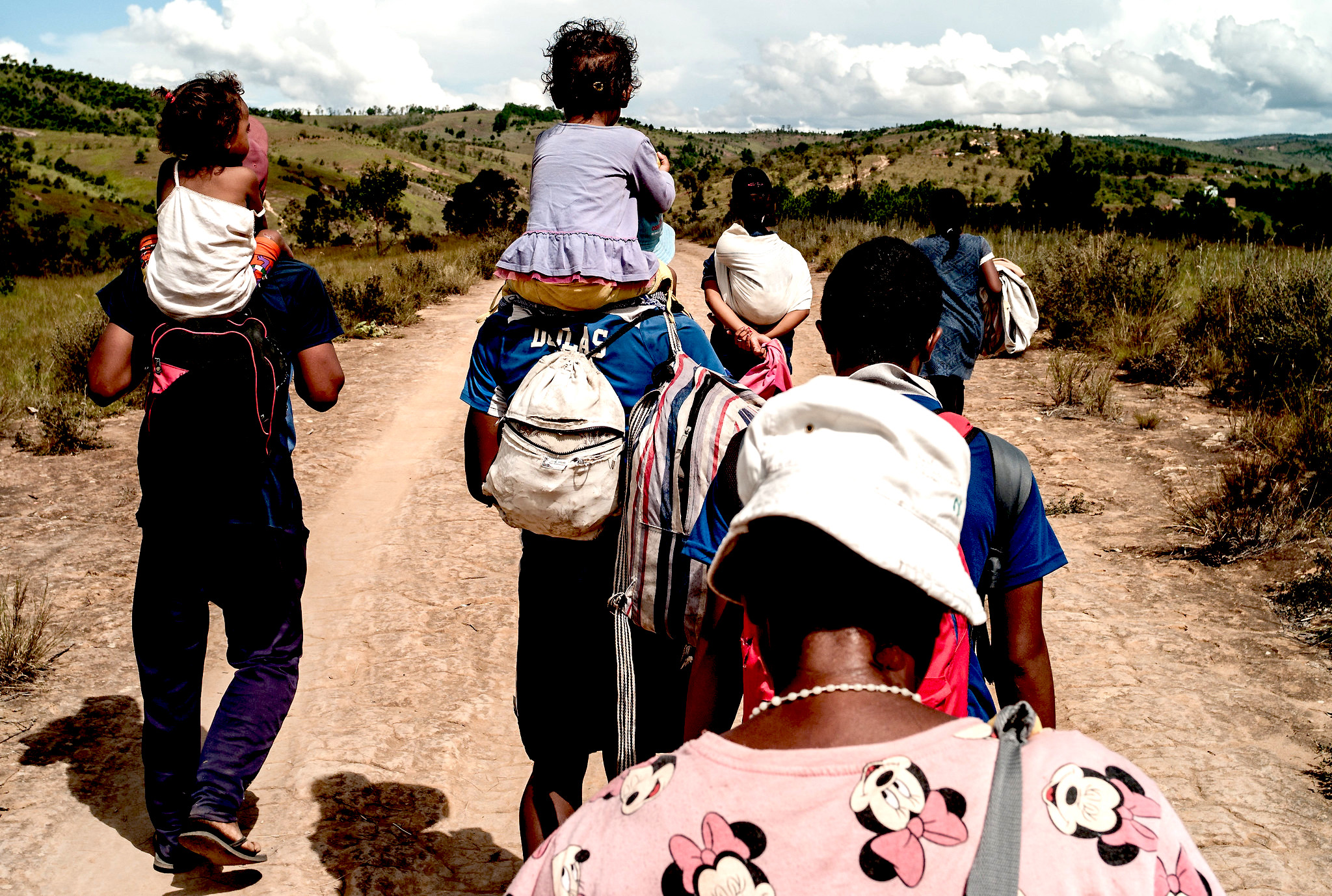Oxfam estimated that “for every $1 the IMF encouraged a set of poor countries to spend on public goods, it has told them to cut four times more through austerity measures.”

World Bank Group’s spring meetings April 2023 in Washington, D.C. (World Bank, Flickr, CC BY-NC-ND 2.0)
The International Monetary Fund insists that “social spending floors” enacted as part of its loan programs for poor and middle-income countries help protect critical social services from the kinds of austerity that the powerful institution has historically imposed on borrowers.
But an Oxfam International analysis released Thursday in the midst of the IMF and World Bank’s spring meetings found that the fund’s spending floors — part of a strategy implemented in 2019 — “are proving largely powerless against its own austerity policies that instead force countries to cut public funding.”
The humanitarian group estimated that “for every $1 the IMF encouraged a set of poor countries to spend on public goods, it has told them to cut four times more through austerity measures.”
“The IMF’s ‘social spending floors’ encouraged raising inflation-adjusted social spending by about $1 billion over the second year of its loan programs compared to the first year, across the 13 countries that participated where data is available,” Oxfam estimated. “By comparison, the IMF’s austerity drive has required most of those same governments to rip away over $5 billion worth of state spending over the same period.”
Oxfam’s report comes as poor countries are facing what the United Nations described Tuesday as a “lost decade” due in large part to soaring debt levels and interest rate hikes implemented by the U.S. Federal Reserve and other central banks.
The U.K.-based advocacy group Debt Justice released figures earlier this week showing that in 2023, lower-income country debt payments will reach their highest level in 25 years, endangering spending on healthcare, education, climate action, and more.
Spotlight on IMF Programs During Pandemic Havoc

World Bank Group President David Malpass and International Monetary Fund Managing Director Kristalina Georgieva at the spring meetings in Washington, D.C., which are focused on the “complex challenges facing the global economy. (World Bank, Flickr, CC BY-NC-ND 2.0)
For its new report — “IMF Social Spending Floors: A Fig Leaf for Austerity?” — Oxfam analyzed data from 17 low- and middle-income countries that agreed to long-term loan programs with the IMF in 2020 and 2021, years in which the coronavirus wreaked havoc across the globe.
The group found that the IMF’s social spending floors were ineffective at achieving their stated goal of preserving minimum levels of social investment.
“Based on the available data, not one of the 17 countries currently has a social spending floor large enough to cover the cost of meeting the World Health Organization’s target to reach the Sustainable Development Goal for Health, let alone targets in other areas like education,” Oxfam found. “The floors agreed by the IMF with Chad, Cameroon, Jordan, and Madagascar meant that their social spending targets set in the IMF program had actually decreased by 3-5% over the course of their loans.”
Amitabh Behar, Oxfam International’s incoming interim executive director, said that “to make matters worse, these social floors have become more like ceilings.”
“While only half of the 17 countries we analyzed had actually met their minimum social spending floors — which is disappointing enough — just two had spent 10% more than what they agreed with the IMF,” Behar added.
The report comes months after a separate Oxfam analysis found that 13 out of the 15 IMF loan programs negotiated during year two of the Covid-19 pandemic required “new austerity measures such as taxes on food and fuel or spending cuts that could put vital public services at risk,” including healthcare.

People leaving the capital of Madagascar in March 2020 due to loss of employment during the Covid-19 pandemic. (World Bank, Flickr, CC BY-NC-ND 2.0)
Half of low- and lower-middle-income countries cut health spending as a share of their budgets during the first two years of the Coronavirus crisis, Oxfam and Development Finance International estimated last year.
In its Thursday report, Oxfam suggested a number of improvements the IMF could make to its loan programs to shield poor nations’ key public services from cuts.
“The IMF should set social spending levels to at least meet the spending goals and social outcomes set in countries’ development strategies,” the group recommended. “These should be social spending goals supported by macroeconomic frameworks that enable rapid progress towards the Sustainable Development Goals.”
Oxfam also argued that “social spending floors should be increased through progressive revenue-raising measures, especially different forms of wealth taxation, rather than reallocating resources or budget cuts.”
“While the ‘social spending floors’ initiative retains its original urgency and promise,” Behar said in a statement Thursday, “it is being undermined by the worst effects of austerity that the IMF is pursuing much more enthusiastically.”
Jake Johnson is a staff writer for Common Dreams.
This article is from Common Dreams.
The views expressed in this article and may or may not reflect those of Consortium News.

The developing collapse of the US dollar is the best news yet. The Global South/Global Majority are about to kick Uncle Sam’s ass. In Jamaica, the Rastas say, “To purposely cause suffering is wicked.”
I’ve said this before, I’ll say it again….
I remember when I first heard the US’s China bashing “BRI is a debt trap” line, I laughed out loud. The real debt trap operation is the IMF which is a clever operation to allow multinationals, especially US multinationals, to buy up the assets of former colonies who remained poor at distressed fire sale prices whilst keeping said countries in debt slavery to the US dollar.
when we talk about “institutional racism”, or better “institutional ethnocentrism, ‘narcissism’ and xenophobia” it should be seen at a cultural level; almost anything and everything in the west is wired in that sense; sometime consciously but mostly unconsciously.
the fact that there was an unjust distribution of covid vaccine worldwide, the fact that the media have presented biased information in Ukraine that reinforce our narrative, the fact that UN is a basically a western puppet, are just few example of this “institutional racism” at a much larger scale. Nazism was not a product that came out of the blue, it came to existence because of a culture that presented those characteristics amplified by socioeconomic hardship…
what about our support for human rights framework? is even that the result of ethnocentrism? I believe we have developed and promoted human rights not so much to protect “others”, but mainly to protect ourselves by making illegal what we did to other cultures for centuries and could one day (soon) be done to us; so yes, in that sense, I believe our support for human rights is again about ethnocentrism, narcissism and xenophobia
As a result of the events in the Maidan in 2014 the then President, Victor Yanukovic, was involved in a choice of negotiations with the Russian reconstruction proposals, which had been in the works for some time, and the IMF/WORLD BANK plan for the future of the Ukraine.
Well of course anything involving the IMF should have set the alarm bells ringing with regard to the intentions of the West and its institutions for the future of the Ukraine; such conditionality clauses were very much in the tradition of the IMF and their ‘Structural Adjustment Policies’ (SAPs) have always been the scourge of the developing world and this offer was enough to scupper the brokered EU deal. Prime Minister Azarov at that time stated that ‘’the issue which blocked the signature of the EU deal were the conditions proposed by the IMF loan being negotiated at the same time as the budget cuts and 40% increase in gas prices’’. This for a country already verging on bankruptcy. In store for the Ukraine was the usual neoliberal austerity package. Compliments of the IMF’s Structural Adjustment Policies (SAPs) this would involve the following set of prescriptions:
1. Balance of payments deficit reductions through currency devaluation = SAP
2. Budget deficit reduction through higher taxes and lower government spending, aka austerity = SAP
3. Restructuring foreign debts = SAP
4. Monetary policy to finance government deficits (loans from central bank – with strings) = SAP
5. Raising food prices to cut the burden of subsidies = SAP
6. Raising the price of public services = SAP
7. Cutting wages = SAP
8. Reducing domestic credit = SAP
9. ‘Reforming’ pensions = SAP. Marvellous word ‘Reforming’
10. Deregulation of labour market. = SAP aka smashing labour unions
Longer-term ‘structural adjustment’ policies usually include:
1. Liberalization of markets to guarantee a price mechanism = SAP
2. Privatization, or divestiture, of all or part of state-owned enterprises = SAP
3. Creating new financial institutions. Hedge Funds, Shadow Banks, Private Equity = SAP
4. Improving governance and fighting corruption – Yeah Right
5. Enhancing the rights of foreign investors vis-à-vis national laws = SAP
6. Focusing economic output on direct export and resource extraction = SAP. That is to say, the creation of a peripheral economy a raw material exporter.
7. Increasing the stability of investment (by supplementing foreign direct investment with the opening of domestic stock markets). Financialization of the host economy = SAP
Just what the doctor ordered, no! These policies have been tried everywhere and have failed abysmally. Little wonder Yanukovich took the Russian offer instead!
The IMF and IBRD (so-called World Bank) simply put, are institutions of US Financial Imperialism and financial parasitism. The US has de-facto veto power at both institutions, no other single country does. Both institutions use the Almighty Dollar, no other currency. Loans are made in USD and must be repaid in USD.
A way to make poor countries pay tribute, and a way to dictate domestic economic and political policy to them via the “conditionality” agreements that come with the loans. Privatization means opening domestic markets to US corporate takeover. Austerity means stealing domestic resources and giving it to the IMF ( banksters). No need to bomb or invade when entire countries can be reduced to debt-peons and bond servants. Although the threat of bombing always supports the acceptance of the US dollar and US diktats.
However, as de-dollarization continues, it looks like the days of IMF/IBRD are numbered. Far more favorable arrangements can be made with other countries in non-USD transactions. In the meantime: abolish the IMF and IBRD.
As I have been calling the IMF for the longest time: I-nstant M-isery F-ollows . This US institution knows no shame.
JHC… get pretty weary repeating… but… “inconvenient” truth still… Truth!
As in: 80’s BushI 2 “Tells” re: Engineered Austerity imposed on US cits:
1. Fed min wage up only 20 Cents since…
2. Same Legislators walk past homeless “crisis” vics… do nada.
ClintonI (no II this commenter can help it) / Gingrich axis adds Means Testing… result: Our Kids Go Without!
At any rate tnx CN / Jake 4 reporting 3rd World same!